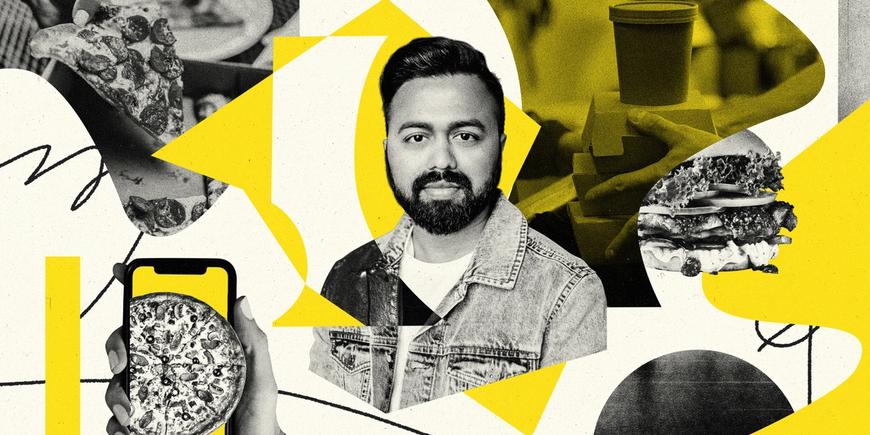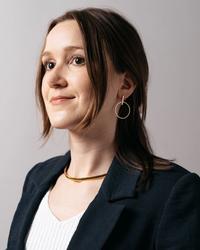How Lunchbox Handles Hiring, Fundraising, and Tough Times Alongside Primary
“These people have seen the evolutions, they know how to help me through tough things, which is much more valuable than capital,” says founder Nabeel Alamgir.

Nabeel Alamgir’s story is, at this point, restaurant legend. After moving from Bangladesh to Kuwait to Queens, he learned English watching Scorsese movies and took an after-school job bussing tables at the original Bareburger. Within a few years, he was the growing chain’s Chief Marketing Officer.
Working his way up gave him a 360-degree perspective on what it takes to run a successful restaurant. And what quickly became clear is that restaurants need better tech. So he started Lunchbox, a business in a box that helps small chains growth hack and stand up against the bad deals delivery platforms offer.
As an unproven entity in the startup space, it took 73 pitches to ultimately find a first investment. That investment was from Primary. We saw the vision, the opportunity, and more than anything, his ability to execute. And Nabeel has delivered, growing his customers by 925%, helping them increase sales by an average of 30%, and leveraging all this success into a $20 million Series A last year, which we also supported. This is the story of how he’s built this strong momentum, and how Primary has partnered with him along the way.
Know yourself, know your space
“Every CEO leans into certain things,” Nabeel says. “We leaned toward marketing, branding, and storytelling—and my restaurant background.”
All his first customers were friends and peers and people he knew from his work at Bareburger. “Restaurant people are entrepreneurs. Restaurant people are more entrepreneurial than tech people. My life is easier today as a tech founder than it was as a restaurant person. Restaurants are hard, the margins are so thin. You deal with so many people. And it's so important to be kind to restaurateurs, because they’re jaded, they’re cranky.”
Understanding the intricacies of how they work, what they care about, and what solutions will speak to them has been a huge advantage. “I started working as a busboy at Bareburger at 17. And I never left that company until this job. So working every role and empathizing with every role, it makes it easier for me now when I speak to restaurateurs.”
He’s brought that understanding and his identity as a restaurateur into the brand. “Our graphics and visuals are my tattoos—restaurateurs have a lot of tattoos. It's just being yourself unapologetically. It's not printing something up for absolutely no reason. Anthony Bourdain just looked and travelled. He didn't try to ‘discover’ it or do anything else to it. And when I speak to restaurateurs, I'm just talking about pain points, and I'm talking about our struggles and what we are bad at right now, and that goes a long way with restaurateurs. That's the edge.”
How Primary has sharpened the edge
Hiring, first of all. Nabeel brought in Head of Talent Alison Kaizer earlier this year, but the first 50 hires—make-or-break, really important placements—were all on him. Well, him and Gina Yocom. “I couldn't have done it without Gina. She sends me tons of candidates. We've hired so many candidates Gina sent me. My Head of Product, one of my most important hires, came from Gina. And even all the other things in between, not just candidates, but how do I comp this person? How do I talk to them? How do I lure them here? How do I tell them that this is a good place for them? Gina's helped strategize with all of that.” Rebecca Price, an Operating Partner, is also close at hand to talk through considerations like advisory shares recommendations and compensation plans.
And before he brought in a VP of Sales, he had Operating Partner Cassie Young. “Her background as a CRO is so useful,” Nabeel says. She interviewed candidates for the role—"the most important role in a startup at this stage”—and was a close partner on putting the team and strategy together. Even now that the team is up and running, she remains close. “I emailed her this morning,” Nabeel says, “asking, ‘Hey I have this contract, can you advise me on how I should calculate this?’”
General Partner Brad Svrluga is the go-to for “all the high-level and tough things,” Nabeel says. “Being a founder you live in isolation. You get credit for everything, and you get blamed for everything. And during those moments, you go to Brad.”
“At first I was afraid to bother investors,” Nabeel says. “It took me a second to realize I shouldn’t be embarrassed or shy about it. Brad says, ‘You're not bothering me. This is my job.’ My job is to go out and perform and help my team succeed. Their job is to help me perform and succeed. And when you get them into the weeds of things, they’re already there with you during the tough days. You have to build trust and lean on each other and invite not only critical input, but also positivity to uplift you and vice versa.”
“So how you make them part of your external fractional team is important. I'm constantly leveraging them and their backgrounds because they've been there and seen that. In an environment like this, everyone has capital, and it's not that hard to raise if you can show some sign of life. These people have seen the evolutions, they know how to help me through tough things, which is much more valuable than capital.”
Learning from the Primary portfolio founders
Working with the Primary team doesn’t just mean access to the firm’s staff, it’s also a starting point for close relationships with other founders of ascending category-defining brands in New York City.
Nabeel credits Brad and Ryan Denehy, founder and CEO of Electric AI, for warming him up to the idea of getting a professional coach—a decision that’s been life-changing for him. “I might have heard that suggestion like I’m doing a bad job, almost like a ‘Screw you,’ but Brad made it very un-alarming. He said he has one too, and suggested I talk to Ryan, a very prolific CEO from another one of the portfolio companies, Electric AI, about it. Ryan took that call because of Primary, because of Brad, and they introduced me to my current coach. And when you hear it from a founder, you trust it more, no matter how much you love your investors. I’ve worked with this coach for the last six months and love her so much. She’s going to be on our cap table soon. That recommendation has been so impactful for my company. Everyone in my organization is better for it.”
Nabeel regularly calls on Ilir Sela, the founder of Slice, Dane Atkinson, the founder of Odeko and previous CEO of Squarespace (“I love that company; I always ask him for advice”), Jonathan Wasserstrum from SquareFoot (“we’re always making fun of each other on Twitter, in a healthy way”).
“So there's a lot of CEOs in that portfolio that I respect. And that they're all in New York makes it even better.”
Getting to the Series A and beyond
Primary also made key intros to tee up Nabeel’s Series A. “The respect for Brad and his track record made the conversation 50 percent complete by the time I showed up,” Nabeel says. “Warm intros start you off with trust and respect and admiration for each other.”
The team at Primary also helped craft much of the due diligence material and served as a reference for new investors. “There was something that the investors didn't love about me. They called Brad, and Brad reassured them that it's fine. So he was on the last call, and trying to close that deal. And that's a big deal.”
Maybe most importantly, it goes without saying, is that there’s a personal connection here, and that’s what drives the depth of work we all do together. “I love the team at Primary,” Nabeel says. “And the way we’ve approached working together is end-to-end, it’s just endless. The list is endless.”
